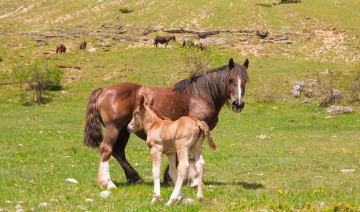
Pregnant Mare Problems
Pregnancy is a delicate condition for any animal, including horses. Being aware of the most common pregnant mare problems can help you stay alert to the health of your horse and her unborn foal. The more familiar you are with the mare’s condition, the easier it will be to correct any possible complications that may occur.
About Equine Pregnancies
A mare can be fertile and ready to breed as early as 18 months old, but it is often better to wait to breed a mare until she is four years old. At that time, she will have reached her mature size and be better able to support an unborn foal, and any health concerns or behavioral issues will be well known. If they are healthy and in good condition, mares may be able to breed until they are in their mid-twenties.
A horse’s pregnancy lasts approximately 11 months, though some mares do give birth slightly earlier or slightly later. Mares naturally go into heat and are receptive to stallions in summer, which means they will deliver their foals in late spring or early summer, just when the pasture is richest and the weather is most clement. This allows the first few weeks of the foal’s life to be safe and to give it a healthy start.
Some horse breeders may artificially manipulate a mare’s heat seasons to influence when she may get pregnant and give birth, depending on their breeding needs and their goals for the foal, such as racing stock, sale, or show seasons.
A mare could have a new foal every year, but it is generally better to breed mares every other year instead. This gives the mare plenty of time to recover from her pregnancy as well as to focus her energy on the needs of a new foal for sufficient time before getting pregnant again. Just how often to breed a mare will ultimately depend on the horse’s overall condition, her success with past pregnancies, and veterinarian recommendations to ensure the health and well-being of both the mare and the foals she will produce.
Common Problems With Pregnant Mares
Some mares have easy, uncomplicated pregnancies, while others may develop a range of difficulties. Even a mare that has had a simple pregnancy in the past may still have complications, particularly as she ages. Common problems with horse pregnancies include…
- Colic
If a mare is prone to colic or develops uterine torsion, rolling and twisting to relieve the pain will cause stress to the unborn foal. Toxins can also develop in the mare’s body and can impact the foal. To minimize the risk of colic, keep up the mare’s deworming schedule as appropriate, monitor her diet carefully, and make any necessary dietary changes slowly to minimize digestive distress. Feeding a pregnant mare more frequent but smaller meals can also help regulate her digestion and lower the risk of colic.
- Fescus Toxicosis
Fungus that grows on fescue grasses can cause abortions in pregnant mares or may cause her to hold a pregnancy too long before delivering the foal, which can cause birth complications. To reduce the risk of fescus toxicosis, treat pastures the mare visits to prevent the fungus infestation and also treat her feed so no fugus develops.
- Laminitis
If a mare is already prone to laminitis – malformations in the hooves – pregnancy may exacerbate that condition as she gains weight with the foal’s growth. Offering low energy feed without carbohydrates can help lower laminitis risk, and the mare’s weight should be monitored carefully. If laminitis does develop, take care to treat it with medication that will not be harmful to the unborn foal.
- Internal Injury
If a pregnant mare is kicked or bumped roughly, or if she gets excited and may run into an obstacle, the foal could be injured. These injuries are more common in late-term pregnancies, but could occur at any stage. Choosing a mare’s pasture companions carefully for gentle interactions is helpful to minimize the risk of these injuries, and a pregnant mare should only be exercised with great care and gentleness to minimize stress.
- Obesity
Just because a mare is pregnant, that does not mean her feed intake needs to double to nourish her foal. If a mare gains too much weight, increased fat will compress the birth canal and may make delivery more difficult. Furthermore, the foal could be deprived of oxygen throughout the later weeks of pregnancy or when being delivered. Keep close track of the mare’s weight and provide her with good quality food rather than focusing only on the quantity of feed.
- Malnutrition
As a mare gets pregnant and her foal develops, her nutritional needs will change. If her feed is not adjusted appropriately, the foal could suffer from low weight, decreased growth, bone and joint diseases, poor brain development, and other difficulties. Check with your veterinarian about the proper feed to meet the mare’s changing needs throughout her pregnancy.
- Twins
Twin foals may seem sweet and endearing, but a twin pregnancy can be very dangerous for a mare and most often twin foals are sickly and may not survive. A veterinarian can diagnose twins when the mare is just two weeks pregnant, and great care should be taken throughout the pregnancy for the best possible result. If a mare is prone to twin pregnancies, it may be best if she is not bred frequently.
- Uterine Artery Rupture
As mares age, their arteries become less flexible and elastic, and the strain of pregnancy and supplying blood to the fetus can cause an arterial rupture. If this happens, it is likely that both the mare and foal would die as the artery bleeds out. Older mares are at greater risk of this condition and breeding should be undertaken only with great caution and frequent veterinary checkups.
Keeping Your Pregnant Mare Healthy
Being aware of the potential problems with a pregnant mare is the first step in keeping both the mare and her unborn foal healthy throughout the gestation and birth. By working closely with your veterinarian and considering the mare’s complete health history, you can provide proper, gentle care for a safe and smooth pregnancy. Always provide the mare with proper nutrition and keep her in good condition, and she will be well prepared to nurture the next generation of equine lineage.
